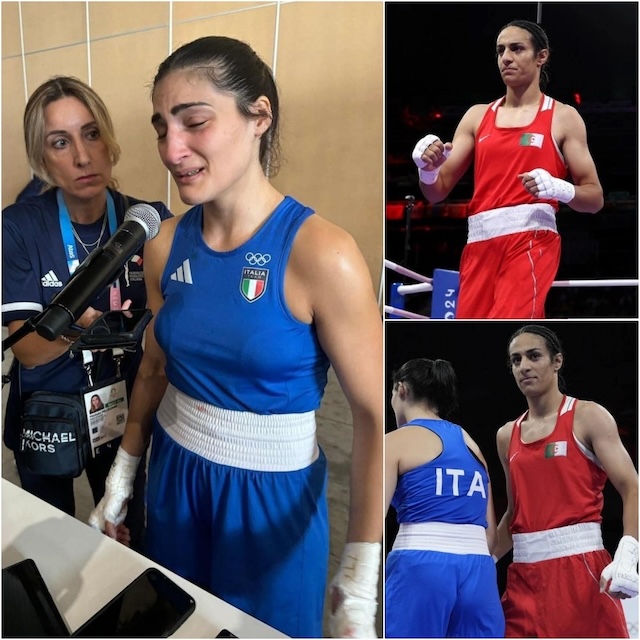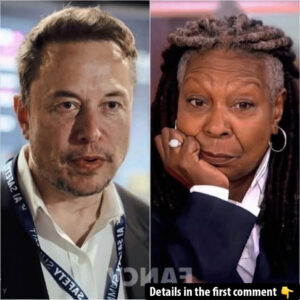The Olympic boxing arena saw unexpected drama as Italian boxer Angela Carini forfeited her match against Algerian opponent Imane Khelif just 46 seconds after the bout began. This abrupt decision highlighted broader debates around eligibility and fairness in women’s sports, especially as Khelif’s participation had already sparked controversy over her fitness to compete.
Carini’s Swift Exit and Emotional Response in the Ring
In the opening round of the women’s welterweight bout in Paris, Carini endured two powerful punches from Khelif, prompting an immediate reaction. The strikes appeared to knock Carini’s chin strap out of place, leading her to retreat momentarily to her corner. She returned briefly to the center of the ring but then signaled her decision to abandon the fight. This swift departure stunned onlookers and resulted in Khelif being declared the winner. Carini’s emotional state was evident as she remained in the ring, visibly tearful.
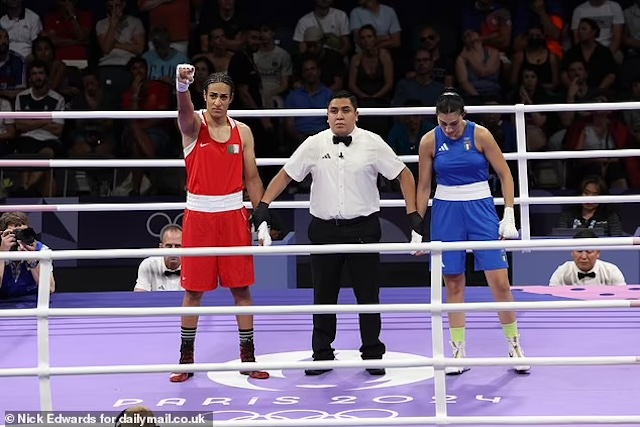
After the match, Carini explained her decision to ANSA, an Italian news outlet. “I went into the ring to fight. I didn’t give up, but a punch hurt too much and so I said enough,” she stated. Despite the unusual outcome, Carini assured her supporters that she was leaving the ring “with my head held high.”
Imane Khelif’s Controversial Olympic Journey
Khelif’s participation in the Paris 2024 Olympics was already mired in controversy. She had previously been disqualified from the Women’s World Boxing Championships in 2023 for failing to meet eligibility criteria related to her testosterone levels. This earlier incident had raised questions about her fitness to compete in women’s sports, yet Khelif was still cleared to compete in the Olympics under the International Olympic Committee’s (IOC) standards.
Background on Khelif’s Disqualification and Medical Conditions
Khelif’s disqualification in New Delhi, shortly before a scheduled gold medal match against China’s Yang Liu, added complexity to her athletic career. The Algerian Olympic Committee (COA) defended her eligibility, attributing the disqualification to “medical reasons” and calling it part of a conspiracy to prevent an Algerian gold medal win. Both Khelif and Taiwanese boxer Lin Yu-Ting, who faced similar eligibility issues, are believed to have conditions related to Differences of Sexual Development (DSD), which can influence hormone levels and physical characteristics.
The International Boxing Association (IBA) issued a statement regarding the disqualification, clarifying that Khelif and Lin Yu-Ting did not undergo testosterone-specific testing but were assessed under separate criteria. According to the IBA, these tests concluded that both athletes had competitive advantages that exceeded the required eligibility threshold, sparking continued debate.
Reactions from the Algerian Olympic Committee in Defense of Khelif
In response to mounting scrutiny, the COA issued a statement condemning what it called “baseless attacks” on Khelif’s character. The COA described such media coverage as “unethical targeting,” particularly as she prepared for what they considered the pinnacle of her career. They underscored Khelif’s right to compete and committed to taking measures to protect her dignity as an athlete.
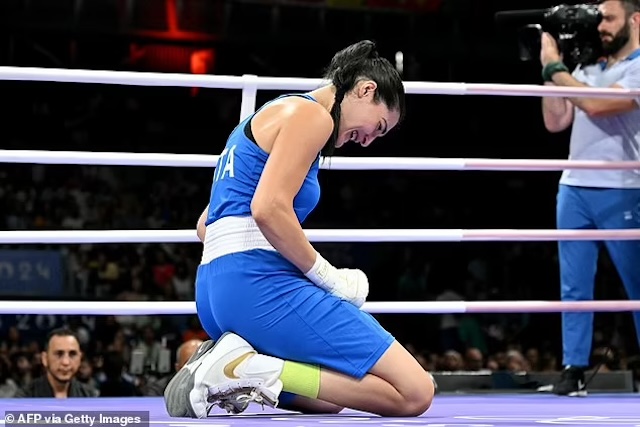
The Broader Fairness Debate in Women’s Boxing
Khelif’s case spotlights a larger debate on hormonal standards and eligibility in international sports. The IBA and the IOC differ in their approach, with the IOC’s guidelines, which permit Khelif’s participation, being less stringent than those enforced at the IBA’s events.
Hormonal Standards and Eligibility Criteria Discrepancies
The controversy arises partly from the inconsistent application of hormonal standards. DSD-related conditions can result in elevated testosterone levels, which may give athletes physical advantages. The IBA argued that these elevated levels pose safety and fairness concerns for female competitors, while the IOC, in contrast, maintains eligibility standards that some consider more inclusive, allowing athletes with such conditions to compete in the Olympic Games.
Statements from the IBA and IOC’s Stance on Fair Play
The IBA has expressed discontent with the IOC’s differing regulations, suggesting that the lack of alignment may jeopardize both the safety and fairness of competitions. The IOC has stated that their guidelines have remained consistent with those used in prior Olympics, including the 2016 Rio and 2020 Tokyo Games, and maintains confidence in their fairness.
Italian Officials’ Reactions and Safety Concerns
The match also drew criticism from Italian officials, who questioned whether Carini’s bout with Khelif upheld fair competition. Italian Sports Minister Andrea Abodi raised safety concerns, stating, “I find it difficult to understand that there is no alignment in the parameters of minimum hormonal values at an international level.” Abodi stressed that for events symbolizing sportsmanship and fairness, protecting the safety of all athletes should be paramount.
Family and Equal Opportunities Minister Eugenia Roccella added to the debate, raising concerns about the fairness of Khelif’s participation and suggesting that the eligibility rules may have allowed an uneven playing field for Carini. These statements reflect Italy’s broader call for unified standards that ensure fairness and safety across international events.
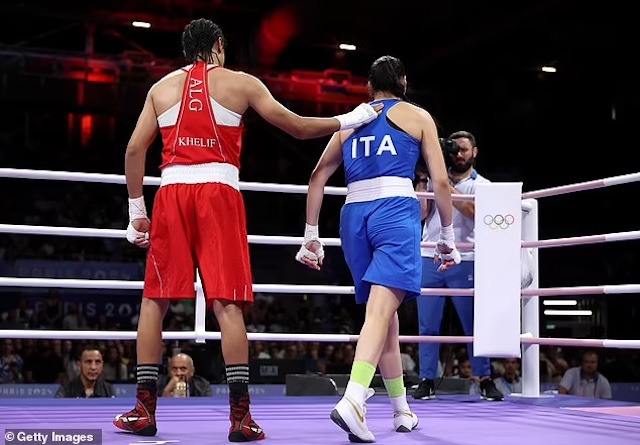
The Italian Sports Federation’s Reserved Response
While Italian ministers voiced strong opinions, Italy’s boxing federation president, Flavio D’Ambrosi, took a more reserved stance, deferring to the Italian National Olympic Committee (CONI) on official comments. D’Ambrosi expressed his commitment to Olympic protocols, stating, “With prudence and institutional responsibility, I am leaving it up to CONI.” His statement emphasized a desire to maintain respect for the integrity of the Olympics.
In its public statement, CONI affirmed its dedication to upholding Olympic values and ensuring that all athletes’ rights align with the Olympic Charter. The statement did not reference Khelif or the specifics of Carini’s bout but highlighted the importance of fair and respectful competition.
Implications for Future Olympic Regulations
As the discussion around Khelif’s eligibility unfolds, it signals possible shifts in Olympic regulations for future competitions. The complexity of balancing inclusion, safety, and fairness remains central to the ongoing dialogue.
The challenges observed in Paris 2024 underscore the need for a unified approach to hormonal standards in international sports. Clearer, more consistent eligibility criteria may help prevent similar controversies, ensuring that athletes compete on a fair and equal footing in future Games. The current case of Angela Carini and Imane Khelif may well influence the development of these standards, shaping the landscape of Olympic regulations for years to come.
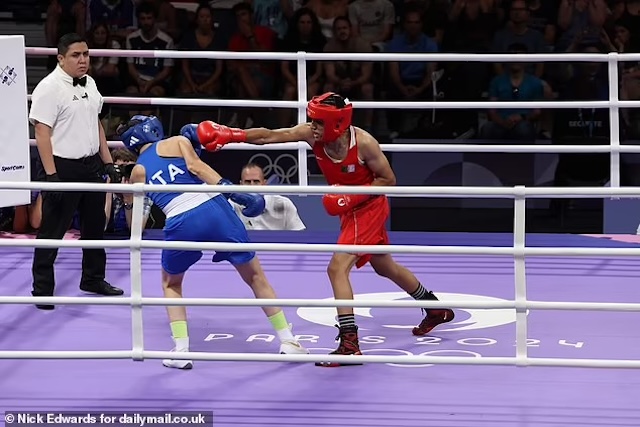
Conclusion
The case of Angela Carini and Imane Khelif at Paris 2024 underscores significant challenges in maintaining fairness and safety in women’s sports. With discrepancies in hormonal regulations between the IBA and the IOC, calls for consistent standards are more pressing than ever. As officials, athletes, and organizations debate eligibility and fairness, the outcome of this situation may lead to stricter and clearer criteria for future events. Ultimately, ensuring equitable competition while respecting athletes’ rights will be crucial for fostering integrity in international sports competitions moving forward.
